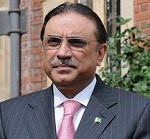Ambassador Deo is correct that Pakistan’s military still has a great deal to say about foreign and defense policy. This is a troubling hangover from decades of military rule. It does not, however, negate the emerging reality that Pakistan’s overall power equation has begun to tilt in favor of civilians.
Today the military’s efforts to influence the composition of the next government are constrained in ways that prior attempts by khaki-clad generals were not. Censorship (for instance, blocking a popular online music video critical of the military) now tends to backfire, drawing attention to precisely what the military wishes to hide. This upcoming weekend, a former beneficiary of Inter-Services Intelligence (ISI) funding, Nawaz Sharif, appears set to win elections even though he has become an outspoken critic of the top brass.
Even the military’s choices about how and when to conduct operations are increasingly hemmed in by civilian opinion. Throughout 2009, for instance, Pakistan’s generals planned and timed their counterinsurgency offensives in Swat and FATA with a close eye on public attitudes and civilian political debates, particularly when battles were likely to displace millions of people from their homes.
Although Pakistan’s last government was unable to dictate terms to the military, over the past decade defense spending has declined as a share of GDP, and parliamentarians showed increasingly active interest in foreign policy. In March 2012, for instance, debates within the Parliamentary Committee on National Security had an unusual influence on the conduct of U.S.-Pakistan diplomacy.
In addition, an overwhelming majority of issues that will determine Pakistan’s future trajectory—economics, education, infrastructure, judiciary, and police—now fall under the authority of civilian politicians and administrators.
Finally, while the military retains ties to dangerous militant groups, it is important to note that some of these relationships have frayed in ways that actually weaken the military relative to civilians. The Tehrik-e Taliban Pakistan (TTP) is at war with the army; for better or worse, when the TTP attacks Pakistan’s secular political parties, it is evidence of military weakness more than influence or connivance.
In this context, the civil-military balance in Pakistan should not be framed as a simple “good versus evil” equation, with the military evil and civilians good. The rise of violent civilian extremists working to bring down the state, democratic or otherwise, is a frightening manifestation of the waning power of the military along with many of Pakistan’s other traditional social and political institutions.
Daniel Markey is Senior Fellow for India, Pakistan and South Asia at the Council on Foreign Relations.
This is part of Gateway House’s online debate, titled ‘The civil-military equation in Pakistan has begun to tilt in favour of civilians.’ Read more on the debate, here.
Has the civil-military equation in Pakistan has begun to tilt in favour of civilians? Send us your comments or feedback to info@gatewayhouse.in or call us on +91 22 22023371.
This article was exclusively written for Gateway House: Indian Council on Global Relations. You can read more exclusive content here.
For interview requests with the author, or for permission to republish, please contact outreach@gatewayhouse.in.
© Copyright 2013 Gateway House: Indian Council on Global Relations. All rights reserved. Any unauthorized copying or reproduction is strictly prohibited.


